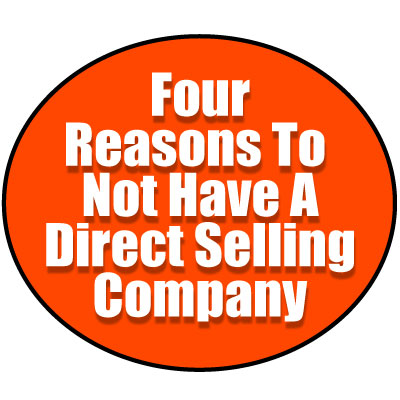 There are many great reasons to start a direct selling company, but what are the reasons not to?
There are many great reasons to start a direct selling company, but what are the reasons not to?
Recently, I was asked this question by a prospective client. My answers helped him to confirm he should move forward into direct selling, so I am sharing them with you now because they may help you, too.
Reasons Not To Do Direct Selling
1. You Don’t Like People
Dave Longaberger, the founder of The Longaberger Company said, “I don’t care what business you’re in, your success will ultimately depend on the relationships you build with people.”
This is especially true when it comes to direct selling.
If you believe you are not a “people person” or if you don’t enjoy talking with people and helping people to live better lives, you should not start a direct selling company.
To have a successful direct selling company, you must build and maintain relationships with the people who will contribute most to your success and those people will be your independent representatives.
2. You Have No USP
Differentiation is the key to successful marketing. A Unique Selling Proposition (USP) is one or more unique selling points.
Creating a USP is work, work best accomplished by completing an exercise. Jot down the following information:
Sales Methods
How is this product sold? One to one? At-home parties? Is it demonstrated? If so, what are the elements of the demonstration?
Delivery Method
Identify how you apply or use your product.
Benefits
How do you feel after you use it, wear it, taste it, etc.?
Experience
What is the experience of the customer while using the product? What is the experience after using it? How long will the experience last?
Make It Memorable
What does the customer remember about the product that makes her or him want to use it again or recommend it to others?
Tag Line
Sum up the benefits in as few words as possible. Try stating the benefits like this, “It blanks my blank.”
3. You Cannot Buy Low, Sell High
The direct selling business model works when the products or services offered by a company are marked up high enough to fund the company’s compensation plan and overhead while leaving sufficient room for profit.
Multiplier
Your multiplier is the average number you get when you divide the retail price by your landed cost. For example, if the retail price for an item is $50 and your landed cost is $10, your multiplier would be five ($50 / $10 = 5).
The higher your multiplier, the more you can afford to pay out in-field compensation, and the more you will earn in pre-tax profit.
4. You Fail The Survival Test
Did you know that successful direct selling companies depend on the presence of purchasers who buy the company’s products or services (and continue to do so) while they are making little or no money through the company’s income opportunity?
You would like all of your independent representatives to make great money through your compensation plan. However, the reality is that the majority of your representatives will make little or no money on the sales volume of others because most people will never recruit anyone.
Are these non-recruiters worthless to your company?
The answer is “no” if enough of them will (a) sell your products to non-participants in the income opportunity and (b) continue to buy your products even if they are not earning any money.
Answer This Question
- “Will people buy your products or services even if they are not making any money through your income opportunity?”
If no one will buy your products unless they are making money through your compensation plan, your long-term business success and legal survival will be in danger.
Tell Me Something Good
Would you like to know the reasons to start a direct selling company?

 Jay Leisner, the President of Sylvina Consulting, is a top compensation plan and direct selling expert, a trusted adviser to new and established network marketing and party plan companies. For more than 30 years, Jay has enjoyed assessing and improving network marketing, party plan and referral marketing companies across the globe.
Jay Leisner, the President of Sylvina Consulting, is a top compensation plan and direct selling expert, a trusted adviser to new and established network marketing and party plan companies. For more than 30 years, Jay has enjoyed assessing and improving network marketing, party plan and referral marketing companies across the globe.
Leave a Reply